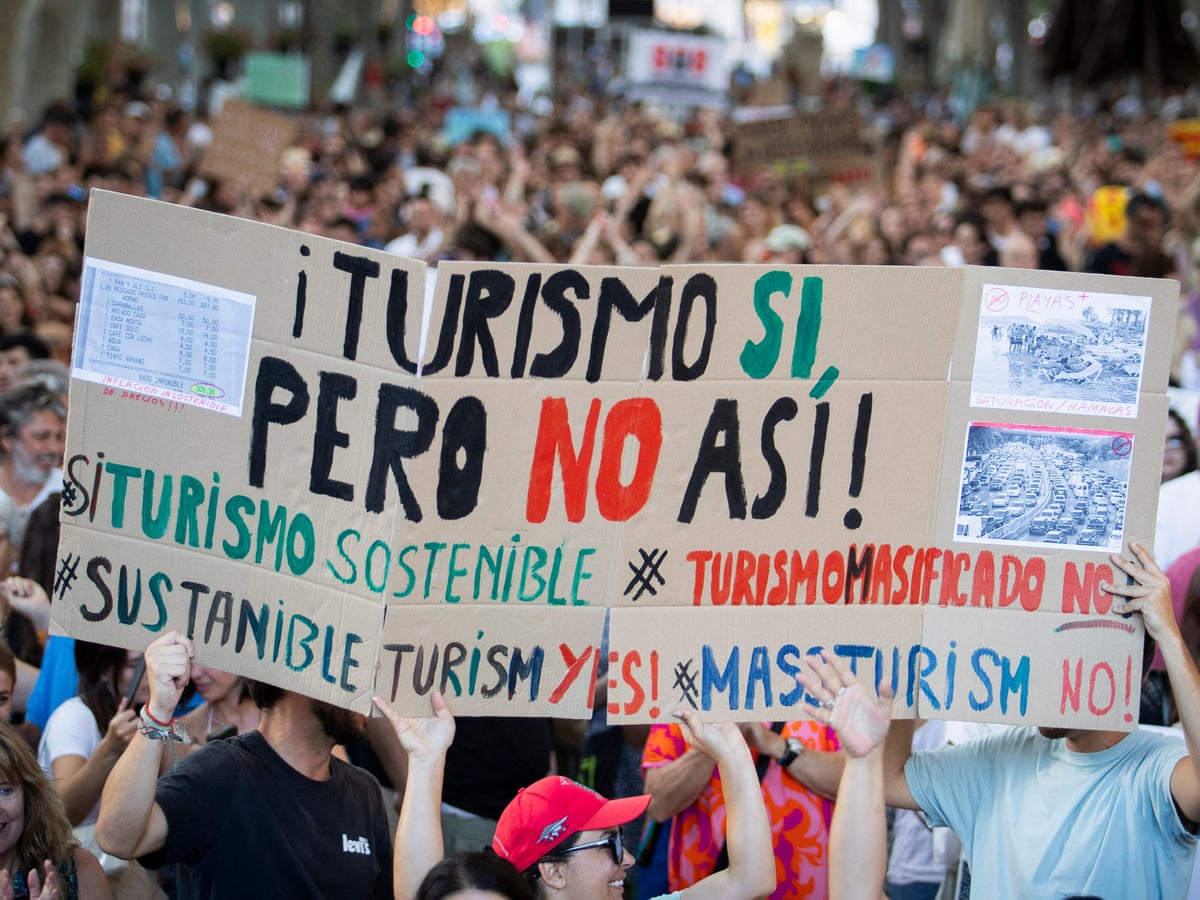 |
| Photo by The Guardian |
On July 6, thousands of anti-tourism demonstrators marched through the streets of Barcelona, demanding a reduction in mass tourism, chanting slogans like “Tourists go home.” However, data shows that tourists continued to flock to Spain’s most popular destinations.
Just a month after the protests, Spain’s tourism board sent a contrasting message, promoting the country as “the summer you’ll want to repeat every year” and welcoming visitors with open arms.
The protests, which at times involved confrontations and water guns aimed at tourists, did not seem to deter many travelers.
Spain’s National Statistics Institute reported that 10.9 million international visitors arrived in August, a 7% increase from the previous year.
Interestingly, the top destinations for international travelers were the very regions where anti-tourism protests occurred.
In August, 2.4 million visitors traveled to the Balearic Islands, including Mallorca, marking a 4% increase from 2023.
Catalonia, home to Barcelona, saw 2.3 million arrivals, a 6% jump, while Andalusia welcomed 1.6 million visitors, up by 9% compared to last year.
A survey conducted by Mallorca’s tourism board revealed that 89% of American travelers were either unaware of or unfazed by the protests. Among those aware of the demonstrations, nearly 70% said the protests had no impact on their decision to visit.
Short-Lived Impact on Tourism
Although travel data firm RateGain reported a 23% dip in hotel bookings and a 35% drop in search activity for Barcelona in the immediate aftermath of the July protests, the decline was temporary. Within six weeks, bookings rebounded.
Booking.com, Europe’s largest online travel agency, also confirmed that it saw no long-term impact on bookings to Mallorca or Barcelona following the protests.
Protests Continue
Daniel Pardo Rivacoba, a member of the Assembly of Neighbourhoods for Tourism Degrowth, the group behind the Barcelona protest, emphasized that the July march was only the beginning of a larger movement.
The organization is calling for a 50% reduction in ticket sales to popular tourist sites like Park Guell, a limit on cruise ships docking in Barcelona, and an end to public funding for tourism promotion.
In response, the city council released a 135-page “Government Measure for Tourism Management 2024-2027” in September, outlining 55 initiatives aimed at managing tourism more sustainably.
However, Rivacoba criticized the measures as insufficient, calling them “cosmetic” and accusing city officials of prioritizing revenue over meaningful change.
While Barcelona’s City Council acknowledged the challenges of overtourism, it emphasized that tourism is a critical part of the city’s economy, contributing 14% to its GDP.
Officials stated that the focus should be on managing the flow of visitors, not reducing their numbers.
Despite ongoing protests and calls for change, Spain’s tourism industry shows no signs of slowing down, with tourist numbers continuing to rise and future demonstrations planned.
Anti-tourism activists remain determined, believing that they are gaining public support and media attention for their cause. As Rivacoba stated, “We are somehow winning the struggle.”
The question remains: will Spain find a balance between managing overtourism and sustaining its vital tourism economy, or will protests continue to challenge the industry’s future?
Tags: anti-tourism demonstrators, Daniel Pardo Rivacoba, Assembly of Neighbourhoods for Tourism Degrowth, Spain